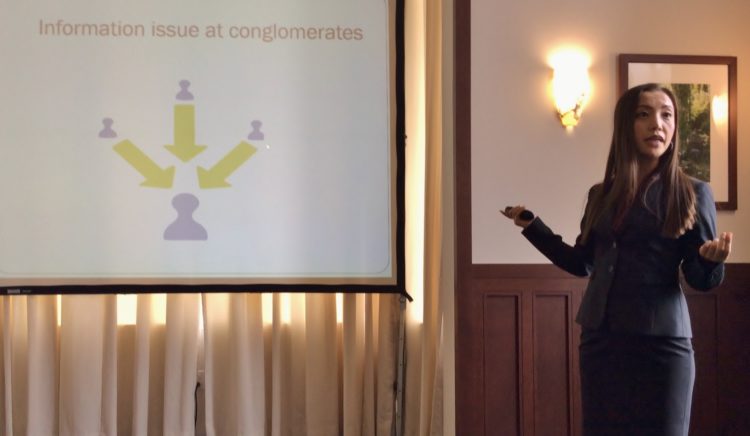Judges of the 2015 Olin Award competition couldn’t choose just one winner this year from the field of relevant and rigorous research papers submitted by Olin faculty, so they named two winners. Professors Andrew Knight and Anne Marie Knott were each awarded the prize.
Professor Knott presented her paper, “Explaining the Broken Link Between R&D and GDP Growth,” on March 27 to business leaders from industries including pharmaceuticals, life sciences and technology, energy, and household product manufacturing.
Knott’s latest research grew out of her work on developing a measure of R&D productivity called the Research Quotient (RQ), which forms the basis for CNBC’s annual firm innovation rankings. RQ measures the percentage increase in revenues achieved from a 1 percent increase in R&D spending, and fits the construct in growth theory that predicts a firm’s profits, growth, and market value.
In searching for an explanation of RQ declines at some companies and the broken link between R&D productivity and GDP growth Knott realized there was a culprit hiding in plain sight: outsourced R&D!
Firms failed to realize outsourced R&D has zero returns! Thus while a 10% increase in internal R&D increases later revenues by 1.7%, a 10% increase in outsourced R&D has no impact on later revenues.
The good news is this problem is easily reversed! And it’s likely R&D can again drive firm and economic growth. If firms restore their prior R&D productivity levels by gradually bringing outsourced projects back in house, Knott predicts growth in firm revenues and GDP will follow.
Learn more about Professor Knott’s articles and presentations.
________
An Invitation
The 2015 Olin Award co-winner, Professor Andrew Knight, will present his paper “Who Defers to Whom and Why? Dual Pathways Linking Demographic Differences and Dyadic Deference to Team Effectiveness” on May 12. Professor Knight’s research explains what drives interpersonal influence in teams and connects patterns of influence to team performance. Register for this event by emailing your RSVP to CorporateRelations@olin.wustl.edu.
Read more faculty research and watch professor videos here.






 Duguid’s research paper,
Duguid’s research paper, 
